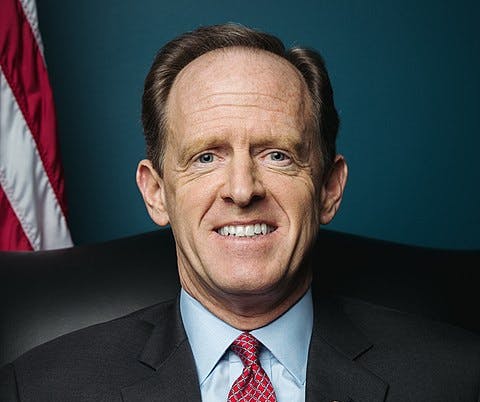Toomey, We Hardly Knew Ye
Republican opposition to Sarah Bloom Raskin’s nomination is shaping up as a decisive moment not only for the direction of the Fed but for the larger question of monetary reform in this country.

What a tragedy that Pat Toomey is leaving the Senate. His statement today calling on Congress to begin to assert itself in respect of the Federal Reserve is a terrific beginning to what we hope will be a long and successful struggle to reform our monetary system. It’s just hard to understand why, having fired the starting gun, Senator Toomey is packing his bags and heading for the hills.
Mr. Toomey has framed his choice to step down from the senate as a matter of principle, citing the merit of term limits. He advises he will return to the private sector whence he began his career. Better he should run for another term. If Pennsylvanians re-elect him, he could lead this campaign from his cockpit as — pending the Republicans retaking the majority of the upper chamber — chairman of the Senate Banking Committee.
In his Thursday morning remarks, made prior to testimony from the Fed chairman Jerome Powell, Mr. Toomey began with a rebuke of the central bank’s failure on inflation. It has “reached a forty-year high of 7.5 percent,” he lamented. For years, he has warned how hard it is to “put the inflation genie back in the bottle.” Today, “the genie is out, and the Fed is behind the curve.”
Mr. Toomey was just warming to the cause upon which he has centered his campaign to deny a seat on the Fed’s board to the left-leaning economist Sarah Bloom Raskin, who seeks to use the Fed to address non-monetary questions like climate change. He decried the “growing urge to use financial regulators, including the Fed, to tackle complex political questions outside the financial system.”
As Mr. Toomey sees it, thinkers on the political left are beguiled by questions like whether “to transition to a lower carbon economy? How to address racially charged social issues?” He grants that “these are important issues.” Yet “they’re wholly unrelated to the Fed’s limited statutory mandates and expertise,” fumed the Keystone sage. And “the Fed has been weighing in on every one of these issues.”
Mr. Toomey points to the Fed’s development of a “climate scenario analysis” that some seek to use “to steer capital away from carbon intensive industries.” The Fed held “Racism in the Economy” events where “speakers advocated for racial reparations and defunding the police, among other far-left proposals.” “Does anyone truly think these activities are within the Fed’s statutory mandates?” Mr. Toomey demanded.
Good for Mr. Toomey — a terrific start to what could be a historic campaign in the Senate. It also appears to reflect a sense, shared among many, that the nomination of Ms. Bloom Raskin is shaping up as a decisive moment not only for the direction of the Fed but for the larger question of monetary reform in this country. They will be there even if the GOP manages to deny Ms. Bloom Raskin a governorship of the central bank.
The problems that worry Mr. Toomey are, in our view, a consequence of the age of fiat money in which an institution run by Ph.D. economists is left to make its own rules and doesn’t even have to disclose them even to what, in the Congress, is its very creator. Quoth Mr. Toomey: “I can only conclude that the Fed requires reform.” The way to do that is for the Congress to reclaim its monetary powers.
It is, after all, to Congress that the Constitution grants between 99 percent and 101 percent of the monetary powers delegated to our government. The Founders knew well that in granting the monetary powers to Congress they were granting them to the most political branch in the entire government. The way for Congress to ensure a non-political dollar is to define it in terms of a statutory weight of specie.
That is what the 63rd Congress intended when it created the Federal Reserve in the first place. Congressman Carter Glass, in his immortal memoir “An Adventure in Constructive Finance,” records that it was only after the legislation was reworked to vouchsafe the convertibility of the dollar into gold that Congress agreed to create the central bank in the first place. The best place for Mr. Toomey is at the head of the effort to redeem that promise.

